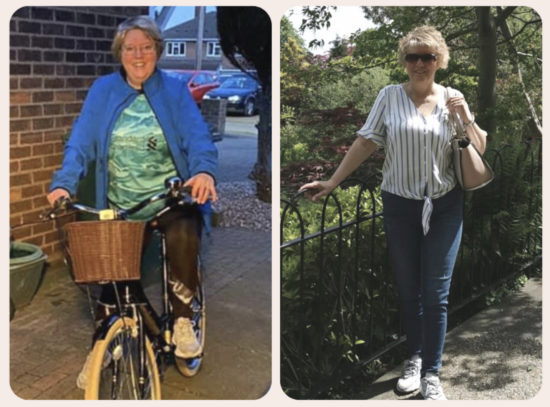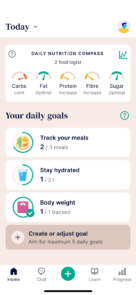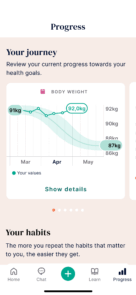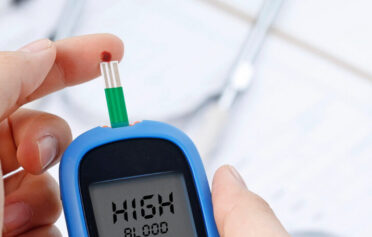
Can you reverse type 2 diabetes?
Interested in the possibility of reversing your type 2 diabetes? While you can’t cure type 2 diabetes, you can put it into remission. Putting your diabetes into remission means that while you still have a diagnosis of type 2 diabetes, your blood glucose levels have, for the moment, returned to a healthy level, meaning you no longer need diabetes medication.
For many, this is life-changing and can have far-reaching health benefits. Oviva can help you achieve diabetes remission through weight loss.
Key Takeaways
- You can potentially put your type 2 diabetes into remission by losing weight.
- Achieving remission can reduce medication needs and lower the risk of complications.
- If you have type 2 diabetes, seeking professional support can help you lose weight safely and effectively with a personalised weight loss plan.
- Oviva provides expert help from healthcare professionals, giving you the best chance of achieving diabetes remission.
How can you reverse type 2 diabetes?
Type 2 diabetes can often be put into remission by losing weight. This usually requires a significant amount of weight loss; the closer you get to losing 10-15% of your total body weight, the greater your chances of achieving remission.
Rather than thinking about how to reverse type 2 diabetes, it’s better to focus on the idea of putting type 2 diabetes into remission. This is because your blood glucose levels could return to their previous levels again, so it’s best not to think of it as a permanent cure.
How does losing weight help?
- Losing weight can reduce fat in and around the liver, pancreas and other organs. Weight loss isn’t just about visual improvement – all cells in the body can lose weight.
- Reducing fat in and around these organs allows them to function properly and also helps to reduce your resistance to insulin produced in your body.
- As organ function improves and sensitivity to insulin increases, your body can start to reduce your blood glucose levels below the range required for a 2 diabetes diagnosis.
- This will mean your type 2 diabetes is in remission, and you’ll no longer need diabetes medication. You’ll also benefit from reduced health risks.
If you have type 2 diabetes and a BMI over 35, you could be eligible for Oviva’s weight management programme. If you’re unsure of your BMI, use our free BMI calculator.
It’s a good idea to seek professional support, as this allows you to lose weight under medical supervision and receive a treatment plan that suits your needs.

I have started to recognise my achievements and have realised how well I have done. I feel so much happier and healthier!
How much weight do you need to lose to reverse type 2 diabetes?
Your chances of achieving remission broadly increase in line with the amount of weight you can lose. A study published in 2018 (Michael EJ Lean et al.) found that 86% of people who achieved a weight loss of 15 kg or more could put their diabetes into remission.
A real-world study from 2024, at scale, found that the mean weight loss in participants who achieved remission was 13.4% of their total body weight or 14.8 kg. However, the precise amount you need to lose to put your diabetes into remission will depend on your body composition, how long you’ve had your diagnosis and other factors that are individual to you.
Oviva patient success stories:

 -22kg
-22kg
Heidi (53)

 -25kg
-25kg
Martin (34)

 -32kg
-32kg
Patricia (53)

How long does it take to reverse type 2 diabetes?
Putting your type 2 diabetes in remission is less about time and more about the amount of weight you’re able to lose. Keeping weight off also helps to maintain remission status.
Remission from type 2 diabetes is defined as HbA1c readings of 48 or under three months after stopping your diabetes medication. Some definitions require two consecutive HbA1c readings under 48, taken six months apart. Therefore, achieving remission is about losing weight, keeping the weight off and seeing sustained improvements in blood glucose over time.
What are the benefits of diabetes remission?
There are so many reasons to work towards achieving Type 2 diabetes remission. Making the healthy lifestyle changes needed to reach remission, like losing weight, can have a big impact on your overall health and well-being.
Here are just a few of the benefits:
- Reduced need for medication
- Lower risk of heart disease and other diabetes-related complications
- Improved mental well-being
- Better sleep and an overall feeling of health
- Reduced risk of arthritis, especially in your knees, hips, and back.

I can now play with my grandchildren without worrying if I will get up off the floor. This experience has been life changing.
Weight loss tips to help bring your diabetes into remission
In the sections below, you’ll find some helpful weight loss tips and information on treatments for obesity, which can help you to lose weight and bring your diabetes into remission:
Diet tips
There’s no single diet that’s guaranteed to reverse type 2 diabetes or bring it into remission, but there are effective ways to lose weight. Try to reduce your portion sizes and focus on nutrient-rich foods. One way to do this is by filling half your plate with vegetables at each meal and focusing on natural, whole foods.
Some people benefit from a short-term, low-calorie diet of around 800 calories daily for 12 weeks. This is sometimes achieved through a Total Diet Replacement (TDR), but this should only be carried out under the supervision of healthcare professionals.

Exercise tips
Increasing your physical activity levels can help you reduce and manage your weight, making it useful for initial weight loss and keeping the weight off. It also directly reduces insulin resistance, which is helpful when trying to improve your blood glucose levels.
Try to focus on sustainable ways to move around more rather than intense exercise routines you won’t be able to sustain.
Use the stairs instead of a lift or escalator, go for regular walks and try to incorporate an element of strength training into your lifestyle if you’re able. Finding a form of exercise you enjoy, like cycling or swimming, can help you stay active for the long term.
Focus on habits
Think about simple daily habits that make it easier for you to lose weight – things like using smaller plates for your meals and practising eating mindfully, meaning you avoid distracted eating and pay attention when you feel full.
Try to have healthy snacks in the house for when you feel hungry between meals. This will reduce the temptation to reach for less healthy snacks.
Mental health tips
Both diabetes and the process of losing weight can take an emotional toll. Be kind to yourself, celebrate progress and seek support from your friends and family.
Take steps to reduce stress and make sure you’re getting enough sleep. Some people benefit from meditation, yoga or breathing exercises, but even taking time to enjoy hobbies can help.
If you’re eligible for Oviva’s programme, you’ll have access to behavioural support from psychologists to help with habit change. However, Oviva does not provide treatment for mental health conditions. Speak to your GP, if you’re struggling emotionally.

Is fasting good for type 2 diabetes?
Some people have success with fasting while trying to bring type 2 diabetes into remission, but it’s not a suitable option for everyone. If you’re at risk of hypoglycaemia or diabetic ketoacidosis (DKA), fasting is not a safe option. Speak to healthcare professionals first.
Are certain foods good for reversing type 2 diabetes?
Try to focus on eating whole or minimally processed foods and eat plenty of vegetables with your meals. Aim for a good balance with lean protein sources, like chicken or eggs, and foods rich in fibre. Eat healthy fats found in nuts and oily fish, and stay hydrated.
Can type 2 diabetes be reversed if you drink alcohol?
In general, it’s best to try to limit or avoid alcohol. Alcohol stimulates the appetite, and many alcoholic drinks have a large amount of empty calories, meaning they offer no nutritional value. This can make it harder to achieve your weight loss goals. We also advise those following a Total Diet Replacement strategy to completely abstain from alcohol for the full 12 weeks.

Is it ever too late to reverse type 2 diabetes?
Your chances of achieving remission are better if you’re within six years of your initial diagnosis, and the very best chance occurs if you’re within the first two years.
Is type 2 diabetes reversible if you’ve had a diagnosis for longer than this? It’s never too late to try. Some people achieve remission even if they’ve been diagnosed for many years.
Even if you don’t reach remission, losing weight can help you manage your diabetes symptoms better, improve organ function and provide additional health benefits.
How Oviva can help your journey into remission
If you have type 2 diabetes, live in England, and have a BMI over 35, you may be eligible for support from Oviva, where you’ll receive personalised care and advice from dietitians, doctors, psychologists and other healthcare professionals.
We have an NHS-funded remission service, T2DR, focused on weight loss to bring blood glucose under control. We also provide an NHS-funded Tier 3 weight management service, with access to prescription GLP-1 medication, like Wegovy, to aid your weight loss efforts.
Speak to your GP to find out if you’re eligible and get a referral.
We come recommended by 97% of our patients, and, on average, people receiving weight loss medication through the service lose 13.6 kg over 12 months.








